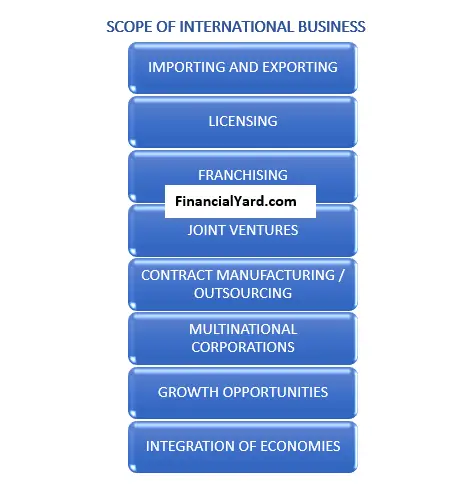A business that operates in more than one country is called an international business. The scope of an international business is that it conducts transactions of goods and services at a global scale. International businesses are large in size and provide employment to a large number of people. The businesses are foreign currency earners for the countries they are based in. International businesses are mainly dominated by multinationals from developed countries such as the USA, UK, Japan and Germany with other international companies originating from developing countries like China and India. In addition to employing highly skilled workers, international businesses have access to the best technological facilities. Their employees enjoy competitive salaries and benefits. As a result, they are able to produce quality products and services cheaply due to economies of scale. Hewlett Packard and Microsoft are examples of international businesses. This article will outline the scope of international businesses. For the nature of international business, check this other article.
Table Of Contents
Scope of International Business

The scope of international businesses is:
- Importing And Exporting
- Licensing
- Franchising
- Contract Manufacturing/Outsourcing
- Joint Ventures
- Foreign Direct Investment
- Growth Opportunities
- Multinational Corporations
- Integration Of Economies
Importing And Exporting
Importing and exporting is one of the scope of international business. This is how many companies link to the global market. Goods and services are exported from one country and imported to the other.
Licensing
Some companies sell products that belong to a foreign company or use their intellectual property for a fee (royalty). This occurs when a company wants to enter the international market quickly at minimum costs and without taking much risk. The local entity and the foreign company enter into an international licensing agreement. That way (the licensee), the local company is able to sell the foreign products or make use of patents and pay the foreign company (the licensor) royalty fees. Licencing is the other scope of international business.
Franchising
An international franchising agreement allows a company (the franchisee) to make use of another company’s brand name or sell its products or services the (franchisor) in exchange for royalties. Franchising is a scope of international business. Many companies such as KFC, McDonalds and Holiday Inn are good examples. Although the franchisee may be responsible for the day to day running of the business s/he will need to follow a business model designed by the franchisor. The franchisor provides training, advertisement as well as product assistance. Franchising is an effective way of expanding globally for companies that operate domestically as evidenced by fast food restaurants and hotels.
Contract Manufacturing/Outsourcing
Due to high labour costs in some countries such as the USA, the manufacturing of products is done in other countries. Such an arrangement is done under an international manufacturing contract or an outsourcing contract. Outsourcing is common in the USA’s clothing industry where manufacturing takes place in china, Malaysia and Mexico. A local company that contracts a foreign company for the manufacture of certain products will still control the product design and development and will label the finished product with its own name. Outsourcing is not limited to the manufacture of products but can also be extended to services. For example, India has become a centre for software development for many American companies. So contract manufacturing and outsourcing is also a scope of international businesses.
Joint Ventures
Joint ventures are the other scope of international business. In some countries, governments do not allow foreign companies to operate within their borders without a local partner. In such cases a joint venture will be ideal. A local and international business can enter into a strategic alliance intended to benefit both parties involved. Such an alliance can improve product quality, increase the market share and reduce production costs among other factors.
Foreign Direct Investment
Foreign Direct Investment is within the scope of international business. Companies and individuals can participate in international markets by making a direct investment in firms that operate in various countries. These companies or individuals build factories and offices in the foreign country in order to do business there.
Growth Opportunities
International businesses facilitate growth opportunities to all the countries involved. Foreign markets are a source of growth opportunity for local companies, as they can expand beyond their borders. Multinational companies also develop the host countries where they will be operating from.
Multinational Corporations
Companies that operate in many countries are called multinational corporations. These companies operate international businesses. Such companies are good in adapting to the local environment of the host nation. Their products and services meet the needs of the people in the countries they operate in. Multinational countries adapt very well to different cultures and economies. Multinational corporations are within the scope of international businesses.
Integration Of Economies
The role played by International businesses cannot be underestimated. International trade is facilitated by international businesses. Since no single country can produce all the products and services required by its population, international businesses play a crucial role in society. The economies of many countries are incorporated by these businesses. Through finance, labour and other forms of resources from several countries, the host countries’ economies are brought together. Raw materials can be sourced in one country, with assembling or production taking place in another country and the finished product can then be sold to various other countries. Companies such as Nike and Timberland, who manufacture their products overseas, are some examples.
Reasons Why Businesses Go International
Apart from the objective of increasing revenue, some scholars have identified other 5 reasons why businesses go international;
- Product Maturity: When a product reaches the maturity stage there may be opportunities for the product to start a new cycle in international markets.
- Competition: Intense competition in the home market can drive a company abroad where there is little to no competition.
- Capacity Utilisation: When a product has recouped its research and development costs in the domestic market, it can be sold in the international market at a price that only covers its production and overheads costs. In many instances such a price will be much lower than prices in the domestic market. This, however, exposes the company to charges of dumping.
- Geographical Diversification: Some companies prefer geographical diversification instead of product line diversification.
- Potential for high demand: the international market offers the possibility of high demand due to the large number of global customers.
Keywords
Economies of Scale
This refers to the low average costs associated with large scale production. Large corporations that buy their raw materials in bulk and process them in bulk have the advantage of having lower unit costs compared to smaller companies.
Maturity Stage
This is the stage in a product’s life cycle where the rate of sales growth declines. It is known to be the longest period of any successful product’s life cycle.
Importing
Buying products overseas and selling them in one’s home country.
Exporting
Selling domestic products to foreign countries
Outsourcing
Using outside vendors to manufacture all or part of a company’s products. Outsourcing also applies to using outside services.
